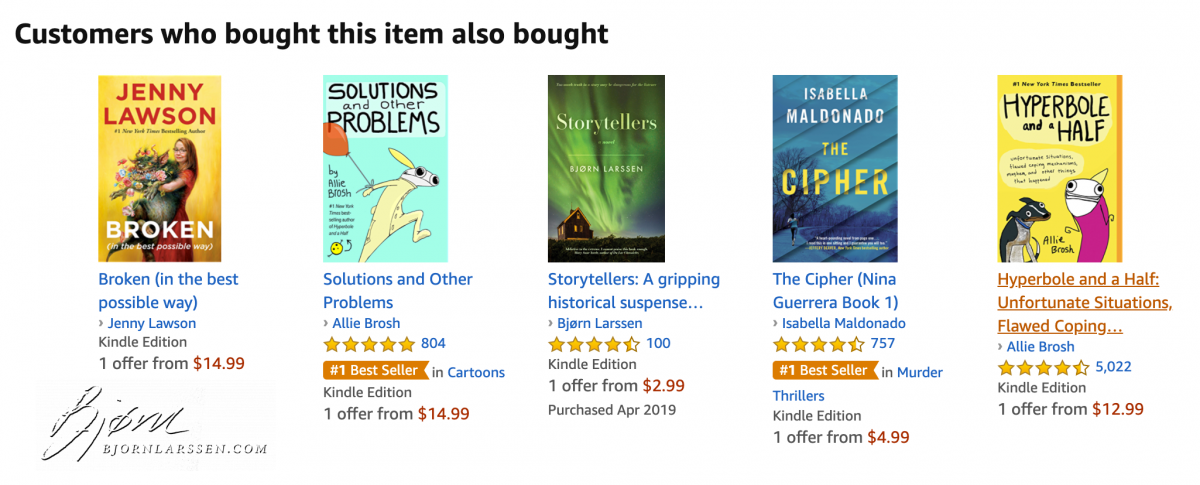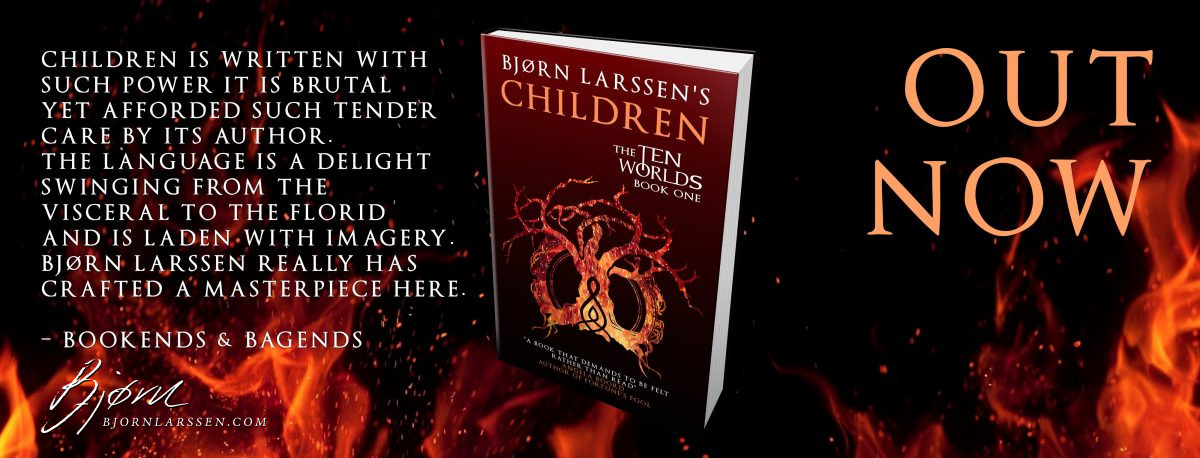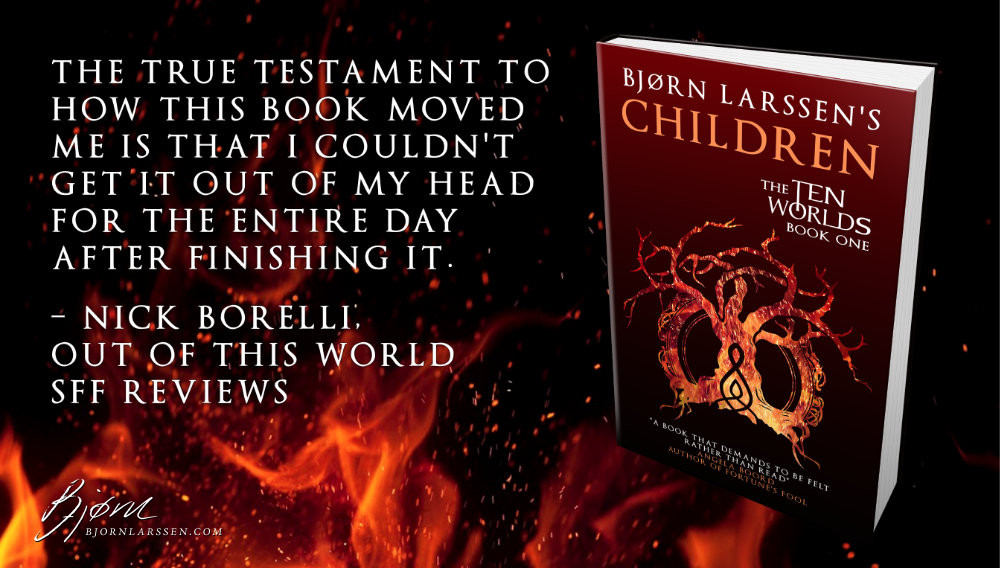
Children is out, and I am proud. You can buy the e-book here. There are more links and excerpts on the Children page.
When the writer finishes the book, they don’t know whether it’s any good. Will the readers stop reading on page 50? Will there even BE any readers? So, the writer has found the target audience carefully approached through various marketing means (I didn’t do that, because I’m a bit of a twatwaffle, about which in a moment), but what if a mistake was made and the Carefully Selected Potential Readers just don’t click on the links? Or they do, but don’t like the cover? They like the cover, but not the blurb? Or the worst – mutter “meh” and go elsewhere? Will the book sell any copies at all?
This is predictable to a certain degree. For instance, I am 100% certain that in the coming year Children will sell fewer copies than Harry Potter and the Philosopher’s Stone, which has been out for 23 years. Whether that will mean 0.001% of Rowling’s book’s sales or 10% (in my dreams) isn’t that easy to predict, but at the end there are maybe a few thousand people in the world who know I exist at all, much less that I write books.
This isn’t the worst part though. Without a team, or at least one faithful and very well-read assistant, I don’t even know what my book is. It took me literally months to decide I would call it queer Norse adult literary fantasy, and I am still not entirely certain whether that’s correct. In order to get people to buy my books, I have to find those right people (then hope they like the cover, then the blurb…) That’s very easy though, innit? I simply find some books that are just like mine, advertise to those readers, $ucce$$ follows.
Also-boughts
Let’s start with the warm-up. What other books do my readers buy?
Amazon has the answer:

You’d think there is no way my book can be anything like Jenny Lawson’s or Allie Brosh’s. It’s not true. While my book has lots of Gods in it and, er, a few more gory deaths, Brosh have the same sense of humour we sprinkle all over sad stories. Unfortunately, while readers of my book might click on Solutions and Other Problems out of curiosity (you should), it’s extremely unlikely to work the other way around. In order to fix this problem I have to start advertising, targeting books similar to mine.
Right after I find them, because I don’t know any. (Any help is welcome, by the way!)
I was hoping the reviewers would give me some hints. One of them was kind enough to brainstorm with me, but it turns out that I have achieved the dream of so many writers and produced a book like no other. Which is wonderful if you don’t care whether anybody buys it. Unfortunately, I want to have my cake and eat it, so I have to take my book like no other and find books that are at least similar… and maybe don’t have cartoon covers.
As an aside, cartoon cover or not, Solutions and Other Problems is just as suitable for children as Children itself.
Book bloggers to the rescue!
Is it any good?
My book’s blog tour, organised by Storytellers on Tour, just ended. I bit my fingernails all the way to the elbows awaiting the verdicts. Book blogging is work. It’s even harder when you commit to writing a review and find out that you don’t enjoy the book. What one person likes will be exactly what another dislikes – but what if everyone dislikes the same thing, of even all of it? I couldn’t wait to find out whether the bloggers would share opinions… and dreaded finding out that they would share one, which would be “what a pile of crap”.
I reminded myself over and over that an objectively good book doesn’t exist, neither does an objectively bad one. For all the flak 50 Shades gets, it sold millions and billions and trillions of copies, and how can a book be objectively bad if it touches so many people? My favourite book of all time, The Hours by Michael Cunningham, averages 3.94 on Goodreads – the latest 50 Shades book, Darker, averages 4.09.
I am a calm lake on a quiet day. Reviews don’t matter to me at all. It’s all about Art, and Art cannot be judged.
“LOL”
Please like me.
“As gorgeous as the cover is, the prose is just as gorgeous, if not more so. I was immediately struck by both the depth of the characters and the flawless dialogue that made me laugh most of the time” – Out of This World SFF Reviews
“The prose actually takes on more of the brutish traits of the world the reader is thrust into.. the language often simplistic. I found the dialogue to be on the weak side” – Betwixt The Sheets
“Children is a fearsome kaleidoscope of genres, it has shades of fantasy, historical fiction; it feels in parts profoundly personal and perhaps even to a degree biographical.” – Bookends & Bagends (I made this blogger cry, then his review made me cry, so well played, both of us)
“It starts with a pleasant, magical mood and in the next moment basically kicks you in the nuts. With a hammer. […] That’s literary fiction at its purest, in that its roots run deep into its characters, nurturing the story’s soul with their own.” – The Bookwyrm’s Guide to the Galaxy
(More reviews and excerpts can be found here.)
As of right this moment the Goodreads average is 4.75, which is not going to last longer than another day or two, because those scores come mostly from people who couldn’t wait for the book. It means that the unanimous verdict isn’t “blergh”, though, and that allows me to breathe again.
A bit.
Not too deeply.
Between the panic attacks.

So, what is it?
The bloggers, who know their stuff, agree that Children is definitely a re-telling of Norse myths.
At least half of the reviews feature the word “brutal”. I didn’t know that. It was similar with Storytellers, where I needed reviews to find out Gunnar initially comes as unlikeable. Same as you get used to the conditions you are living in, I got used to the books I was living in. Gunnar is just my beloved Gunnar, Magni is my sweet Magni, Maya is my BFF Maya, the Gods are sociopaths, we all know that. No? We don’t? It’s just me? Oh.
So – brutal. And, luckily, funny. I thought there were only two really dark chapters hiding among the remaining eight that were kind of light entertainment. With c-PTSD and addiction and endless loneliness and betrayal and mindless cruelty and constant fear, but, you know, apart from that… Oh.
Children is also definitely character-oriented, a large part of it – an examination of traumas caused by parents and strangers alike, and how those traumas shape us. This I already knew, or perhaps hoped for, and I was relieved to find out that I succeeded. Unfortunately, there are no genres called “brutal”, or “traumas that shape us”, or even something I am incredibly proud of – “made grown men cry and share that online”.
Bugger.
Still searching…
Welp, Amazon disappointed me, but Goodreads has a section called “Other people also enjoyed…” – let’s look at that one. I’m sure it will help.
Eternal Forever: The gripping page turner that’ll make you rethink online – Jessie was a shop worker dreaming of the big time, then YouTube found her. But staying in the limelight requires meticulous management: pop stars are made not born.
Never and Forever (The Wizards of Once #4) – The final book in the Wizards of Once quartet – the No.1 bestselling series from the author of How to Train Your Dragon.
You Can Keep That to Yourself: A Comprehensive List of What Not to Say to Black People, for Well-Intentioned People of Pallor – At long last, a much-needed guidebook for well-intentioned people of pallor on what not to say to their African American “friends.”
Oh. (Okay, it also has the wonderful Dan Fitzgerald’s Hollow Road… but unfortunately that’s really about it.)
I’m going to give up and be right back after I finished sobbing in the corner*
*this does not actually happen, because…
How does it feel?
Incredible.

It’s surreal to be a disabled guy who spends most of his time sitting on the sofa with strategically placed pillows under his back, mostly leaves the house to see physiotherapists and/or doctors, then watches something he created described with words such as “masterpiece” and “definitely my book of the year”. It doesn’t compute. The impostor syndrome is currently completely confused and so is the rest of me, to be honest. Some of those reviews make me think – wow, this looks like a book I might enjoy, I should read it sometime… Yes, I’m bragging, bragging is a big part of the Norse faith. Except having something to brag about is surreal as well. It’s been a while.
The best part is finding out that the book made people feel. Even if some of them didn’t really enjoy those feelings very much. I actually don’t mind getting bad reviews… this is probably a bit unusual… because it means that people were moved enough – even if in an unpleasant way – to bother writing them. Sometimes bad reviews contain accidental compliments, because they point out things the reader dislikes, but those things are exactly what I wanted to achieve. Sometimes they point out things that could be improved. There are also times when the reader clearly misunderstood something, which means I didn’t explain it well enough. The only sort of review that would really make me unhappy would say “I have read a hundred books exactly like this one, only better”. (Although then perhaps I could ask for a few examples and target them with ads…)
There actually were people who told me they couldn’t wait for Children, which felt extremely stressful until the day the book came out, and I sort of resignedly accepted that it now existed where people could see it. Approximately two days later I could start stressing out again, because the first reviews said “I can’t wait to see what happens next”. Technically I know what happens next, but I’m having problems writing it down in a way that makes even a bit of sense. And the wonderful initial reception of Children makes it harder, because it turns out that making people cry is kind of addictive. (Why yes, I am a monster. A brutal one.) The next book must be even better. This thought is very useful if you want to feel completely paralysed.
I knew it would be difficult to beat Storytellers and its gold medal, so I didn’t try. I took the risk of trying something completely different, and so far it looks like I succeeded. It feels amazing.
And now… what?
And now… what?
The second book in the series, Land, is going to be a re-telling of the discovery of Iceland. With more Gods. And lots and lots of elves.
I always need to understand my characters first. I thought it would be easy with a series. Unfortunately, I forgot that Land is going to have new characters. One of them is killing me, because he went and developed a personality of his own, one that completely doesn’t fit my plot ideas. Specifically, he was supposed to be a sweetheart, but instead he’s angry – for good reasons, too, and I should have seen it coming. I just don’t know what to do about it. The character metaphorically says “I’d never do that”, but doesn’t tell me what he would do instead. I stare at my outline and I don’t even know whether it will work at all. This is not helping at all. To avoid being constantly nauseous, I went back to working with a Well Known Writer on a cosy mystery (did you see that one coming?). It’s completely different, nobody including me has any expectations, and even if it never actually comes out writing it doesn’t terrify me. So far.
I have to do lots of very specific research for Land. For instance, how would one transport goats from Faroe Islands to Iceland on a knarr in the year 868? Were there even goats (and people) in the Faroes in 868? All I know about goats is that they’re kind of cute assholes, and as for Faroes – that there are LOTS of talented musicians who come from there and the islands look gorgeous on photos. What does it feel like to be on a ship in the middle of the North Sea during a thunderstorm? While Sagas of the Icelanders suggest that Norwegians, Danes, Swedes spoke the same language back then, is that really correct? Is there a way I can avoid involving Harald Fair-hair in the whole thing? (No, but hope dies last.) Is there a pill that cures laziness?
Will people who enjoyed Children for the re-telling of the myths like a sequel that won’t really tick that box?
Will humanity even exist a year from now?
Should I be worried about that sound my laptop is making?
And how in the Nine do I find out what books are similar to Children?!
Here’s a books similar to Children, in my opinion: American Gods.
Thank you! It is similar – and brilliant 🙂
Here’s a book who’s writing is similar to Children and is as equally brilliant: Storytellers. Not sure if you’ve heard of it. You should pick it up. Might give you some ideas.